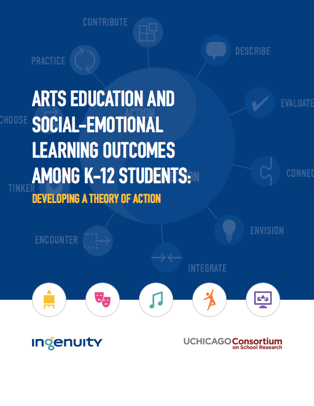Arts Education & SEL: Developing a Theory of Action

Announcing A New Report
UChicago Consortium and Ingenuity examine the relationship between arts education practices and social-emotional development: Study proposes an arts-focused framework that can also be applied to other subjects
CHICAGO (June 11, 2019)—The University of Chicago Consortium on School Research (UChicago Consortium) and Ingenuity are releasing a new report to support educators in the arts and other subject areas in their efforts to contribute to students’ social-emotional development. In Arts Education and Social-Emotional Learning Outcomes Among K-12 Students: Developing A Theory of Action, the authors describe how arts learning experiences have the potential to promote the development of social-emotional competencies and suggest that these developmental processes can be replicable across subject areas. Evidence suggests that practices traditionally found in arts education can play a critical role in developing college- and career-ready skills, such as innovation and collaboration. Participation in arts education processes and practices can translate into the development of both artistic and social-emotional competencies, including self-management, self-discipline, interpersonal skills, and self-expression, that extend beyond arts.
“It is through ongoing cycles of age-appropriate action and reflection that young people build foundational competencies for long-term success. The arts provide an excellent vehicle for this development, but there is nothing magical about the arts when it comes to providing opportunities for young people to tinker, practice, present, and engage in action and reflection exercises that serve to foster their social-emotional development,” said Camille Farrington, Managing Director and Senior Research Associate at the UChicago Consortium on School Research.
The authors reviewed more than 200 studies on arts education spanning six decades. They also conducted focus groups and interviews with key participants in the arts education process—including educators, administrators, students, and parents—to evaluate evidence of the effects of arts education on social-emotional development in school and after-school settings. They found a widespread belief that arts education contributes to children’s and adolescents’ social-emotional development. Specifically that:
- Exposure to arts opportunities allows students and teachers to engage with one another in a way that often stands in contrast to how they engage with each other in the context of regular academic instruction and that provides rich opportunities for social-emotional learning.
- Arts education has social-emotional effects regardless of instructor intent—and these effects can be either positive or negative. Though arts education can be a powerful force in supporting students’ social-emotional development, the report’s findings caution educators to be intentional in the social-emotional contexts they create through their lessons to, as much as possible, promote positive interactions and help students process challenges and disappointments so they don’t end up feeling alienated or ashamed by their arts experiences.
Key Takeaways for Educators
- Be intentional about integrating social and emotional growth into an academic discipline. How an instructor teaches often matters more than what they teach.
- Create safe spaces in which students feel comfortable taking productive risks, opening up to expose their own vulnerabilities, and being challenged.
- Provide opportunities for students to engage in cycles of action (encountering, tinkering, choosing, practicing, and contributing) and reflection (describing, evaluating, connecting, envisioning, and integrating).
This research by Ingenuity and the UChicago Consortium was made possible through a grant from the Spencer Foundation.